THE arrest of a Manila Bulletin data security officer for alleged hacking has sent waved red flags through the Philippine IT and media sectors, because it implicated Art Samaniego Jr., the newspaper’s IT editor and senior technology officer.
Samaniego allegedly used the hacks to create content. This development raises questions about ethical boundaries, the pursuit of sensationalism, and the very nature of journalism in the digital age.
In an era dominated by social media, the hunger for viral content has led some creators to push the limits of acceptable behavior, create content which agrees with their audience even if it is disinformation. From dangerous pranks to illegal stunts, repeating conspiracy theories such as anti-vaxing or the attack on the US Capitol, the recent Zionist propaganda. Some spread outright lies such as the flat earth theory and ‘the pandemic never happened.’
The NBI is currently investigating the potential link between Samaniego and the hacking incidents–especially those that appeared in his columns as “breaking news.” The arrested data officer extrajudicially confessed to working with Samaniego since 2019, carrying out various hacking activities under his direction. Among the alleged targets were the websites of the 1Samabayanan app used in the 2020 elections National Security Council, Armed Forces of the Philippines, and several banks.
If the allegations are proven true, it would constitute a grave violation of journalistic ethics and potentially undermine public trust in the media. It would also raise questions about the motivations behind such actions. Creating disturbing situations simply for content, editorial or otherwise is not even a misguided attempt at investigative journalism, it is more of a cynical ploy to generate sensational headlines.
While content creators and journalists both operate in the digital sphere, their roles and responsibilities differ significantly. Content creators primarily focus on entertaining and engaging audiences, often prioritizing virality and personal branding. Journalists, on the other hand, are bound by ethical codes and legal constraints that prioritize accuracy, objectivity, and public interest.
The allure of viral content is undeniable, but it comes with significant risks. Several high-profile cases illustrate the dangers of pushing boundaries for the sake of views. Wu Yongning also known as ‘China’s Daredevil’ fell off a 62-storey building. His stunt was to collect over $15,000 if successful.
Timothy Wilks a.k.a. the ‘Sovereign Citizen’ was a YouTube prankster who was fatally shot in 2021 while attempting to rob a group of people with butcher knives as part of a prank video. And today June 26, marks the 7th death anniversary of Pedro Ruiz, partner of YouTuber Monalisa Perez (La Mona Lisa) who was sentenced to six months in jail in 2017 after fatally shooting her boyfriend in a botched stunt where they believed a book would stop a bullet.
These tragic incidents underscore the potential consequences of prioritizing viral content over safety and ethical considerations.
The quest for views and followers has often overshadowed ethical considerations and legal boundaries.
This trend has not been confined to individual content creators; it has, at times, seeped into professional journalism, blurring the lines between responsible reporting and sensationalism.
The closest equivalent to viral content in journalism is a breaking story or a “scoop.” Journalists like Dax Lucas, who broke the story on the Bangladesh Bank Heist took pains in following a story and verifying each step before reporting.
The Philippine Press Institute’s code of ethics for journalists states that “I shall accept only such tasks as are compatible with the integrity and dignity of my profession, invoking the “conscience clause” when duties imposed on me conflict with the voice of my conscience.”
The National Union of Journalists of the Philippines (NUJP) has issued a statement emphasizing the importance of the presumption of innocence and the right to due process. The NUJP calls for fairness in the investigation and underscores the ethical concerns regarding journalists instigating incidents for reporting purposes. The organization reminded journalists to resort “only to fair and honest methods” in their pursuit of news.
“In solidarity with fellow media workers, NUJP emphasizes the importance of the presumption of innocence and the right to due process, especially in high-profile cases like this,” the NUJP stated. “Above all, we expect the highest level of fairness in the investigation process.”
The Manila Bulletin hacking scandal prompts a critical examination of reporting practices and the need for stricter adherence to ethical guidelines. The case has also highlighted the potential legal ramifications of engaging in illegal activities for the sake of news gathering.




